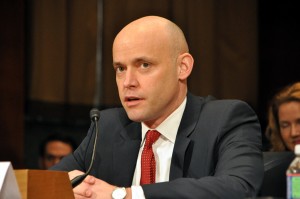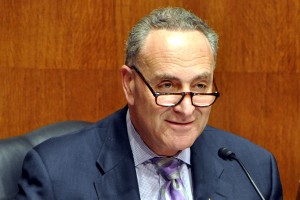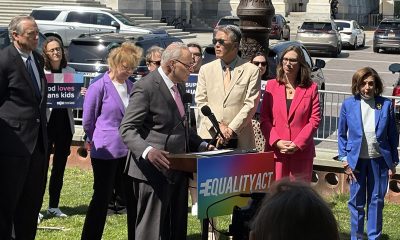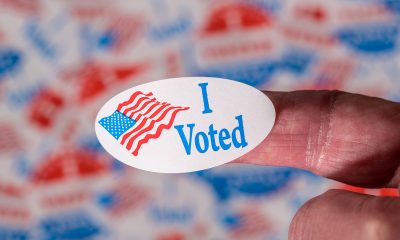National
Gay judicial nominee sails through breezy hearing
Oetken says he values ‘moderation and judicial modesty’
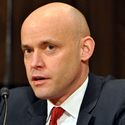
A New York attorney who could be the first openly gay man to serve on the federal bench breezed through a confirmation hearing on Wednesday during which faced only softball questions from Democratic senators.
J. Paul Oetken, nominated by President Obama in January to serve as U.S. District Judge for the Southern District of New York, faced no opposition during a Senate Judiciary Committee hearing that only Sens. Chuck Schumer (D-N.Y.) and Chris Coons (D-Del.) attended.
In his opening statement, Oetken mentioned his partner, Charkrit “Makky” Pratayot, was in the room supporting him in addition to his brother and sister. Oetken said his father wanted to attend the hearing, but was unable because he was recovering from surgery.
Schumer recommended the nomination of Oetken to the president in September. During the hearing, the senator said he values “moderation and judicial modesty” in judicial nominees. Schumer questioned Oetken, along with the other three nominees giving testimony before the panel, what those words mean to him as well as what qualities he thinks are most important in a judge.
In response, Oetken said he agreed that moderation and judicial modesty and “crucial characteristics” for someone sitting on the bench. The nominee said the notion of judicial modesty has two parts: following precedent and decisions from higher courts as well as only deciding a case before a judge and not going beyond the controversy at hand.
“There are learned opinions that are decided for judges … in the Second Circuit and the Supreme Court [that] govern all decisions in the district court in the Southern District,” Oetken said.
Prior to his nomination as a federal judge, Oetken was practicing law at Debevoise and Plimpton. Since 2004, has served as associate general counsel at Cablevision. From 1999 to 2001, Oetken was associate counsel to President Clinton and specialized in First Amendment issues, presidential appointments, ethics, civil rights, and legal policy.
Oetken is also no stranger to roles as an LGBT advocate. The nominee has been involved with Lambda Legal and the American Civil Liberties Union. Additionally, Oetken co-authored a U.S. Supreme Court friend-of-the-court brief in Lawrence v. Texas, which struck down sodomy laws throughout the country.
In his opening statement, Schumer commended Oetken for his qualifications and reputation for moderation, but also noted the significance of having the first openly gay male judge to sit on the federal bench.
“I also look for candidates who bring diverse views and backgrounds to the bench,” Schumer said. “Paul is the first openly gay man to go through an Article III confirmation process in this country, which makes this moment historic. But long after today, what the history books will note about Paul is certain to be his achievements as a fair and brilliant judge.”
Along with Oetken, the committee considered during the hearing three other nominations: Bernice Bouie Donald, who’s been nominated to become U.S. circuit judge for the Sixth Circuit; Paul Engelmayer, who’s also been nominated to become a U.S. district judge for the Southern District of New York; and Ramona Villagomez Manglona, who’s been nominated to become a judge for the district court for the Northern Mariana Islands.
Whether Oetken becomes the first openly gay male federal judge remains to be seen. Obama in January also nominated another openly gay man to the federal bench, Edward DuMont. The president tapped him to serve as an appellate judge and to sit on the U.S. Court of Appeals for the Federal Circuit.
Whether the Senate first grants Oetken or DuMont confirmation will determine who becomes the first openly gay male to serve on the federal bench. Should DuMont receive confirmation, he would also become the openly LGBT federal appellate judge.
While Oetken could be the first openly gay male to serve on the federal bench, he wouldn’t be the first openly LGBT person. In 1994, President Clinton nominated Deborah Batts, an out lesbian, to serve as federal judge also for the U.S. District Court of the Southern District of New York.
Following the hearing, Schumer acknowledged to the Washington Blade the significance of the nomination of Oetken and he commended the nominee for his other qualities.
“There are three standards when I nominate judges: excellence — the should be legally excellent and not a political hack; moderation — I don’t like judges too far right; I don’t like them too far left because they tend to make law; and third is diversity in all its ramifications,” Schumer said. “I’ve worked very hard to diversify the bench and find nominees that meet all three criteria. I’m very proud to nominate Mr. Oetken because it shocked me, basically shocked me, when I heard no openly gay man had been nominated to the federal bench anywhere, and there are hundreds of judges.”
Schumer said the timing for when the panel will consider reporting the nomination to the floor is up to Chairman Patrick Leahy (D-Vt.). Still, Schumer said he hopes the vote will come “as soon as possible.”
Erica Chabot, a Judiciary Committee spokesperson, said senators have up to March 23 to submit written follow-up questions for Oetken. After the responses are returned to the panel, the chairman can list the nomination for a vote during an upcoming meeting.
The Senate is considering the nomination of Oetken after the White House rejected the nomination of Daniel Alter, another New York attorney and former director of civil rights for the Anti-Defamation League, for the same position.
In October, the Washington Blade reported that the White House rejected the Alter nomination, which was recommended by Schumer, based on comments he reportedly made challenging inclusion of the phrase “under God” in the Pledge of Allegiance and suggesting that merchants not wish shoppers “Merry Christmas” during the holidays. Alter has denied he made the reported comments.
Asked why Alter was never nominated, Schumer told the Washington Blade the White House never announced the Alter nomination for “private” issues, but declined to elaborate.
“There were internal reasons related to some issues, but nothing to do with gender, sexual orientation,” Schumer said.
New York
Two teens shot steps from Stonewall Inn after NYC Pride parade
One of the victims remains in critical condition

On Sunday night, following the annual NYC Pride March, two girls were shot in Sheridan Square, feet away from the historic Stonewall Inn.
According to an NYPD report, the two girls, aged 16 and 17, were shot around 10:15 p.m. as Pride festivities began to wind down. The 16-year-old was struck in the head and, according to police sources, is said to be in critical condition, while the 17-year-old was said to be in stable condition.
The Washington Blade confirmed with the NYPD the details from the police reports and learned no arrests had been made as of noon Monday.
The shooting took place in the Greenwich Village neighborhood of Manhattan, mere feet away from the most famous gay bar in the city — if not the world — the Stonewall Inn. Earlier that day, hundreds of thousands of people marched down Christopher Street to celebrate 55 years of LGBTQ people standing up for their rights.
In June 1969, after police raided the Stonewall Inn, members of the LGBTQ community pushed back, sparking what became known as the Stonewall riots. Over the course of two days, LGBTQ New Yorkers protested the discriminatory policing of queer spaces across the city and mobilized to speak out — and throw bottles if need be — at officers attempting to suppress their existence.
The following year, LGBTQ people returned to the Stonewall Inn and marched through the same streets where queer New Yorkers had been arrested, marking the first “Gay Pride March” in history and declaring that LGBTQ people were not going anywhere.
New York State Assemblywoman Deborah Glick, whose district includes Greenwich Village, took to social media to comment on the shooting.
“After decades of peaceful Pride celebrations — this year gun fire and two people shot near the Stonewall Inn is a reminder that gun violence is everywhere,” the lesbian lawmaker said on X. “Guns are a problem despite the NRA BS.”
New York
Zohran Mamdani participates in NYC Pride parade
Mayoral candidate has detailed LGBTQ rights platform

Zohran Mamdani, the candidate for mayor of New York City who pulled a surprise victory in the primary contest last week, walked in the city’s Pride parade on Sunday.
The Democratic Socialist and New York State Assembly member published photos on social media with New York Attorney General Letitia James, telling followers it was “a joy to march in NYC Pride with the people’s champ” and to “see so many friends on this gorgeous day.”
“Happy Pride NYC,” he wrote, adding a rainbow emoji.
Mamdani’s platform includes a detailed plan for LGBTQ people who “across the United States are facing an increasingly hostile political environment.”
His campaign website explains: “New York City must be a refuge for LGBTQIA+ people, but private institutions in our own city have already started capitulating to Trump’s assault on trans rights.
“Meanwhile, the cost of living crisis confronting working class people across the city hits the LGBTQIA+ community particularly hard, with higher rates of unemployment and homelessness than the rest of the city.”
“The Mamdani administration will protect LGBTQIA+ New Yorkers by expanding and protecting gender-affirming care citywide, making NYC an LGBTQIA+ sanctuary city, and creating the Office of LGBTQIA+ Affairs.”
U.S. Supreme Court
Supreme Court upholds ACA rule that makes PrEP, other preventative care free
Liberal justices joined three conservatives in majority opinion

The U.S. Supreme Court on Friday upheld a portion of the Affordable Care Act requiring private health insurers to cover the cost of preventative care including PrEP, which significantly reduces the risk of transmitting HIV.
Conservative Justice Brett Kavanaugh authored the majority opinion in the case, Kennedy v. Braidwood Management. He was joined by two conservatives, Chief Justice John Roberts and Justice Amy Coney Barrett, along with the three liberal justices, Sonia Sotomayor, Elena Kagan, and Ketanji Brown-Jackson.
The court’s decision rejected the plaintiffs’ challenge to the Affordable Care Act’s reliance on the U.S. Preventative Services Task Force to “unilaterally” determine which types of care and services must be covered by payors without cost-sharing.
An independent all-volunteer panel of nationally recognized experts in prevention and primary care, the 16 task force members are selected by the secretary of the U.S. Department of Health and Human Services to serve four-year terms.
They are responsible for evaluating the efficacy of counseling, screenings for diseases like cancer and diabetes, and preventative medicines — like Truvada for PrEP, drugs to reduce heart disease and strokes, and eye ointment for newborns to prevent infections.
Parties bringing the challenge objected especially to the mandatory coverage of PrEP, with some arguing the drugs would “encourage and facilitate homosexual behavior” against their religious beliefs.
-

 U.S. Supreme Court3 days ago
U.S. Supreme Court3 days agoSupreme Court upholds ACA rule that makes PrEP, other preventative care free
-

 U.S. Supreme Court4 days ago
U.S. Supreme Court4 days agoSupreme Court rules parents must have option to opt children out of LGBTQ-specific lessons
-

 National5 days ago
National5 days agoEvan Wolfson on the 10-year legacy of marriage equality
-

 Congress4 days ago
Congress4 days agoSenate parliamentarian orders removal of gender-affirming care ban from GOP reconciliation bill

